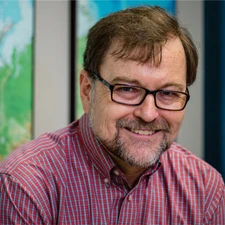Richard G. Gordon

The 2023 Stephan Mueller Medal is awarded to Richard G. Gordon in recognition for his outstanding and innovative contribution to global tectonics, in particular, for his leadership of the NUVEL (Northwest University Velocity) and MORVEL (Mid-Ocean Ridge Velocity) global plate motion projects.
The 2023 Tectonics and Structural Geology Division Medal is awarded to Richard Gordon in recognition of his outstanding and innovative contribution to global plate motions and palaeomagnetism over the last 40 years. After obtaining his doctorate from Stanford University in 1979, Richard Gordon has held positions at Northwestern and Rice Universities. Gordon’s wide-ranging research forms a substantial body of highly cited work with many paradigm-shifting contributions. Gordon is best known for his leadership of the NUVEL (Northwest University Velocity) global plate motion model and, more recently, its successor the MORVEL (Mid-Ocean Ridge Velocity) project. The construction of these models represents an enormous undertaking, requiring a highly accurate quantitative analysis of a wide array of datasets. Since its conception in the 1990s Gordon has, with key contributions from his PhD students, continually improved and developed the models. The fact that NUVEL and MORVEL are today the standard global plate motion models used across the Earth Sciences is testament to the enduring importance and quality of this work.
Early in his career, Gordon introduced the concept of palaeomagnetic Euler poles, which allows the reconstruction of apparent polar wander paths of plates through rigorous and efficient use of palaeomagnetic data. Nearly forty years on, this method is still being used today. In the early ’90s Gordon was also amongst the earliest investigators to use geodetic data for accurate measurement of present-day plate motions. He has led groundbreaking research projects whose results have had major impacts on regional and global reconstructions and dynamics. For example, his work has contributed critically to understanding the kinematics and tectonics of western North America and the Pacific plate.
Gordon’s work is characterised by a rigorous attention to uncertainty and the propagation of errors. His precise work has highlighted fundamental limitations of the original plate tectonic theory. Firstly, the approximation that the interiors of plates are rigid was shown to have limits by Gordon’s quantification of relative motion within major plates. Secondly, his work on diffuse oceanic plate boundaries established that the plate tectonic model needs to allow their incorporation. Thirdly, Gordon has shown that the effects of horizontal thermal contraction of young oceanic lithosphere may be large enough to impact the accuracy of plate reconstructions. His innovative work has made an important contribution to the decades-old debate on the relative motion between hot spots, which have been used as a reference frame for absolute plate motion. Even if this ‘relative fixity’ was and still is the object of controversy, its merit has undoubtedly been to stimulate the debate of ideas.
Throughout his career, Gordon has served his community through editorships, the organisation of many conferences and serving on numerous committees at national, local and international levels. He is a fellow and medalist of the American Geophysical Union (Macelwane medal), the Geological Society of America (Senior Fellow, Day Medal) and a fellow of the American Association for the Advancement of Science. He is a tireless educator and generous mentor of early career students with many of his outstanding graduate students going on to make important contributions to Earth Science in their own right, two of them (C. DeMets and D. Argus) being Fellows of the AGU.
For all these reasons, Richard Gordon is a worthy recipient of the 2023 Stefan Mueller Medal.
